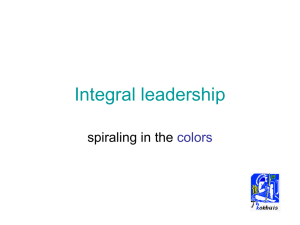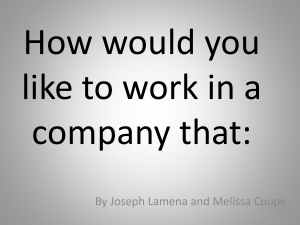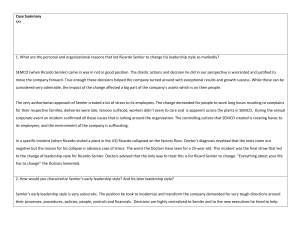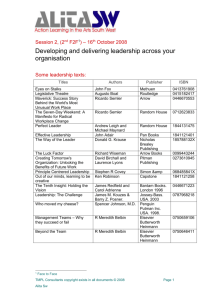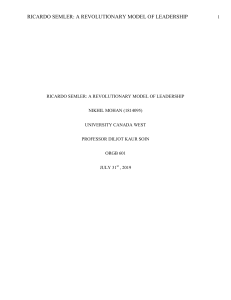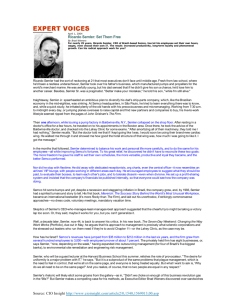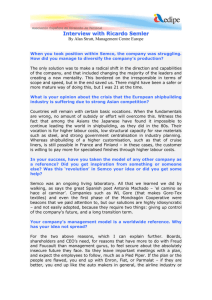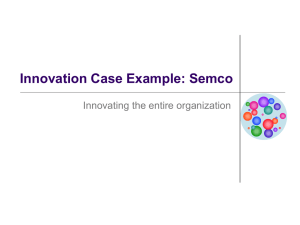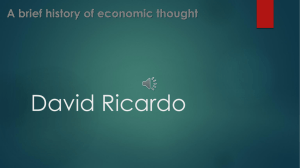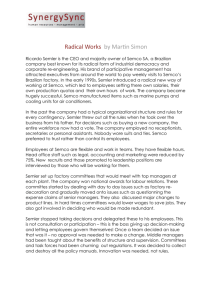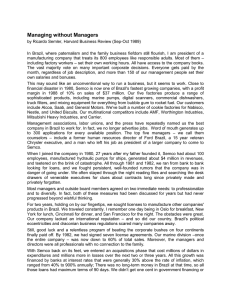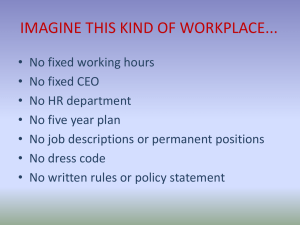Maverick Leadership
advertisement
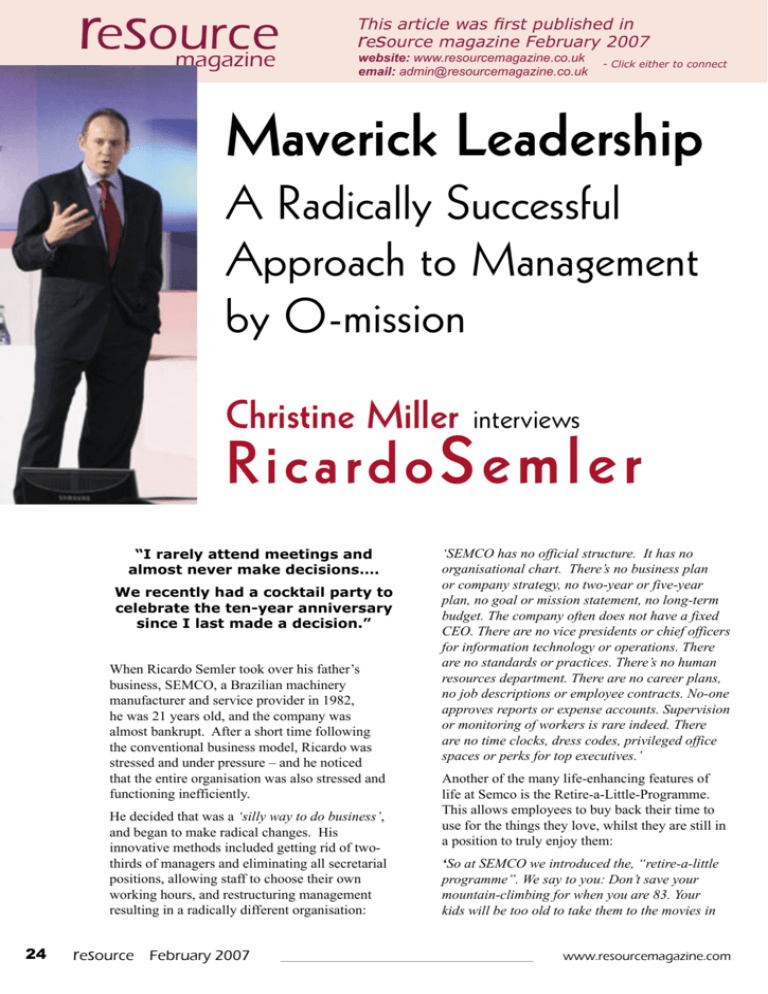
resource magazine This article was first published in resource magazine February 2007 website: www.resourcemagazine.co.uk email: admin@resourcemagazine.co.uk - Click either to connect Maverick Leadership A Radically Successful Approach to Management by O-mission Christine Miller interviews Ricardo Semler “I rarely attend meetings and almost never make decisions…. We recently had a cocktail party to celebrate the ten-year anniversary since I last made a decision.” When Ricardo Semler took over his father’s business, SEMCO, a Brazilian machinery manufacturer and service provider in 1982, he was 21 years old, and the company was almost bankrupt. After a short time following the conventional business model, Ricardo was stressed and under pressure – and he noticed that the entire organisation was also stressed and functioning inefficiently. He decided that was a ‘silly way to do business’, and began to make radical changes. His innovative methods included getting rid of twothirds of managers and eliminating all secretarial positions, allowing staff to choose their own working hours, and restructuring management resulting in a radically different organisation: 24 resource February 2007 ‘SEMCO has no official structure. It has no organisational chart. There’s no business plan or company strategy, no two-year or five-year plan, no goal or mission statement, no long-term budget. The company often does not have a fixed CEO. There are no vice presidents or chief officers for information technology or operations. There are no standards or practices. There’s no human resources department. There are no career plans, no job descriptions or employee contracts. No-one approves reports or expense accounts. Supervision or monitoring of workers is rare indeed. There are no time clocks, dress codes, privileged office spaces or perks for top executives.’ Another of the many life-enhancing features of life at Semco is the Retire-a-Little-Programme. This allows employees to buy back their time to use for the things they love, whilst they are still in a position to truly enjoy them: ‘So at SEMCO we introduced the, “retire-a-little programme”. We say to you: Don’t save your mountain-climbing for when you are 83. Your kids will be too old to take them to the movies in www.resourcemagazine.com resource magazine the afternoon when you are 83. Do it at 33. Buy your Wednesdays back from us and do what you would like to do when you retire. Then, after retirement, sell your Wednesdays to us again, so you will work with us one day a week and we don’t lose all your expertise.’ With a turnover of over £100 million in 2005, SEMCO is now one of Brazil’s fastest growing companies with an enviable staff retention level, high motivation and repeat customers who represent 80% of annual turnover. ReSource had a rare opportunity to talk to Ricardo Semler at the Leaders in London Summit in November 2006, when we asked him about his current ideas and vision for the future. TRANSFERABILITY Christine: Can you foresee your model, your methods being applied globally? Ricardo: We used to have a SEMCO tour. Thirtyfive companies at a time would be given a tour and told how we do what we do. We had one tour every two weeks for years, and it was always oversubscribed. But not one of them took up what we do in full, because it entails giving up control. We have tracked sixteen organizations that ended up taking elements of what we do, but nobody wants to give up control totally and let everyone in the workforce lead. There are a lot of essential anchor points or pillars which are similar over time, even though it is adapted. I’d say that to transfer the idea that working hours, the way work is defined, and the way careers are set up is silly is beginning to sound like common sense. There are more people now who understand that the idea of having a central headquarters and people moving across town to reach you, and having to design a career for themselves is largely ungratifying. These days, it is easy for parts of our rationale to travel; companies could easily adapt it now, as more and more people are requesting this kind of flexibility. If people say, for example, “how could I look at life and free time and retirement in a new way”, companies could easily adapt to that. A lot of companies will adapt to that - not because they have read my book, but because times are changing and there are more people all the time requesting that kind of flexibility. One thing I was saying today, that has become more obvious to me, is that as you look at the people who actually flourish in the organisations that currently exist, you find that these are tough people. These are not reticent people - they www.resourcemagazine.co.uk This article was first published in resource magazine February 2007 website: www.resourcemagazine.co.uk email: admin@resourcemagazine.co.uk - Click either to connect are tough people who didn’t mind elbowing others out of the way. TALENT: TOUGH OR TENDER? And the question is ‘Can you really develop companies that are sustainable, and which are balanced over time, based on people who are tougher than everyone else?’ I think you cannot. So when you look at who this affects - it’s true for women, it’s true for shy people, for introverted people, it’s true for very thoughtful people, intellectual people, all kinds of people who do not find their way up the corporate ladder, usually because they simply do not want to. This is something that is not very clear to organisations, they have the idea that the ones who made it up to the top are the ones who are very successful – that it is Darwinist, and these people got through the pack. But I think a lot of people actually actively choose not to do so; and if your organisation is willing to look for some of these, then you end up with a much better balance and a bigger pool of talent. We recently ran an advertisement for a job opening which generated 3400 candidates. Now out of these 3400, there are probably 600 or 700 people who know that they would not be interested in the process anywhere else, in any other organisation. So perhaps we therefore have the pick of employees, a selection which is definitely not industry wide, and with this diversity we can generate something completely different. There is the story of the hotel which we are building, where out of the 100 people we are employing, only 2 have any previous experience – none of the others have ever been in the hotel business before. We can’t do anything with anybody who has been in the hotel business before – otherwise we are going to emulate other major hotel chains, and then rather than innovating, we will end up with a product that looks everybody else’s. Christine: Tell me more about one of your other innovative projects, the school you are building – that piqued my interest; education can be an uninspiring experience. Ricardo: Education, as we usually see it, is preparing people for a very mediocre life. The process of giving away freedom, of becoming standardized, begins very young. In our case we take kids from 2 – 14 years old, so what we say, which is very simple and comforting February 2007 resource 25 resource magazine This article was first published in resource magazine February 2007 website: www.resourcemagazine.co.uk email: admin@resourcemagazine.co.uk for the parents is– we don’t want kids in class who don’t want to be in class, they have to want to come – because we can’t possibly teach a child something they are not interested in learning. If there is no interest, there is no retention. But it is also slightly scary for parents to think of that, of giving choice, even though it’s only a 2 or 4 year old. It is also scary for CEOs to imagine this scenario: in the business world what you are saying is ‘can I trust people to come in to work at any time they want? These adults, can I trust them, can I know that they are going to spend all their time on the internet working just for me, and not sending emails to all their friends?’. The question is: can you possibly run an organisation if you don’t trust people to do anything? And the answer is - you cannot. Executives must give up control and trust the power of talent. Only then will that person’s calling emerge. TRUST Christine: Trust is a word, or a value, that you can easily take in to the working culture – if you go into a boardroom and start talking about love, for example, it’s too soft and fluffy, but trust is acceptable. Ricardo: Trust is okay, because trust is deciphered in that corporate code as being something that someone else will do for you – the executive’s thought is that ‘they will trust me’. But what we have to say to them is, ‘you have to trust them’ – and then the CEO says ‘What do you mean? I want to know what time they come to work.’ It’s not mutual trust – mutual trust is a much more complicated concept. But, ‘they will have to trust that I am making the right decision’, that’s something that executives can understand immediately. And that’s why they don’t last – how long does an executive last these days, how long do companies last? Not very long, staff retention is very low. A key part of leadership is getting the right people. But recruitment today is like internet dating. Two dates and you get married forever? That’s why turnover is so high. So obviously this doesn’t work – and therefore the idea that you are going to learn to do more of the same is not very exciting. In essence, if you think about it, it is like Freud’s very simplistic solution which basically says that a composition of love and work is the only thing that matters. Every time you throw one of these off-balance, the other one will never rebalance your life, so it’s difficult to concentrate on just one or the other – to say ‘Forget the people you love, forget your kids, just 26 resource February 2007 - Click either to connect do the job right’ – and for what? More money? And then what do I do with that? Exchange it for a newer car, that’s redder or greener than the one before? In essence, humanity doesn’t react well to this –they just do their nine-to-five thing, because they need what they get from that to go and do the things they really love. If you can’t make work into one of the things you really like, there is nothing left. © 2007 Christine Miller Bio: Ricardo Semler, president of Semco S/A, the Brazilian marine and food-processing machinery manufacturer, is internationally famous for creating the world’s most unusual workplace. Semler has been profiled in more than 200 magazines and newspapers, he was also profiled in Time’s special edition, Time 100, which is published every 20 years to highlight global leaders. Named one of the Global Leaders of Tomorrow by the World Economic Forum in Switzerland, he has appeared on television and radio on four continents. CIO magazine selected Semco as the only Latin American company among the most successfully re-engineered companies in the world. The BBC included Semco in its ‘Reengineering The Business’, a series focusing on the world’s five most successful management structures. Semler was named Brazil’s ‘Business Leader of the Year’ in both 1992 and 1990, the same year America Economia (The Wall Street Journals Spanish language magazine) named him Latin American Businessman of the Year. He is vice president of the Federation of Industries of Brazil and a board member of the SOS Atlantic Forest, Brazil’s foremost environmental defence organisation. Contact: Contact Ricardo Semler via: Karen O’Donnell t: + 353.1.230.2322 f: + 353.1.230.2306 e: europe@leighbureau.com Books: Maverick: Publisher: Random House Business Books; New Ed edition (6 Sep 2001) ISBN-10: 0712678867 ISBN-13: 978-0712678865 The Seven Day Weekend: A Better Way to Work in the 21st Century Publisher: Century; New Ed edition (29 Feb 2004) ISBN-10: 0099425238 ISBN-13: 978-0099425236 www.resourcemagazine.com
